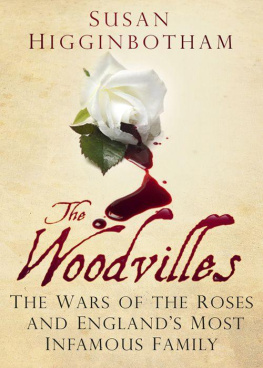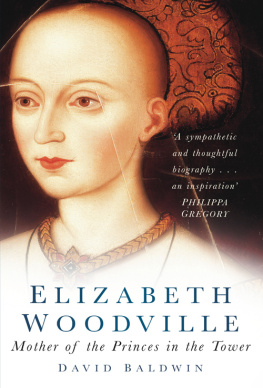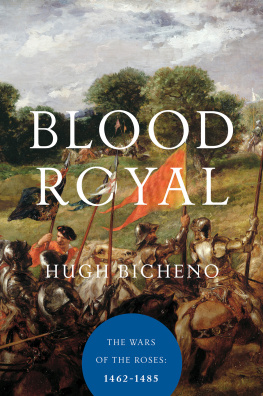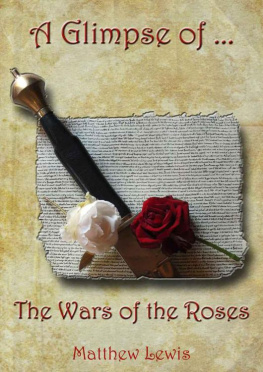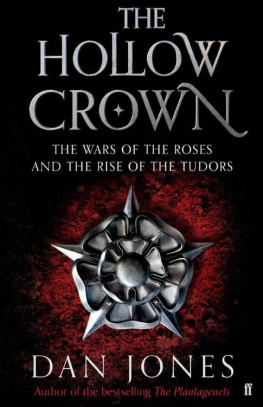Contents
From 1437, when Richard Woodville, a mere knight, made a shocking match to the widowed Jacquetta, Duchess of Bedford, to 1492, when Queen Elizabeth Woodville breathed her last at Bermondsey Abbey, the Woodvilles trod the boards of the great theatre of fifteenth-century history. Their members married into the greatest houses of England, crossed lances with the finest jousters in Europe, patronised the industry that made it possible for you to hold this book today, fought battles at home and abroad, and helped bring down an entire dynasty. Without them, the history of fifteenth-century England would have been very different.
While individual Woodville family members, particularly Elizabeth Woodville, have been the subjects of popular and academic non-fiction, there has not been (to the best of my knowledge) a non-fiction book that takes in all of the family, save for a self-published book that is largely hostile toward the Woodvilles. Due in part to this situation, myths and unsubstantiated rumours about the Woodville family have flourished virtually unchecked. Readers of historical fiction in particular know, for instance, that Elizabeth Woodville orchestrated the murder of the hapless Earl of Desmond, that Jacquetta and her daughter Elizabeth openly practised witchcraft, and that the Woodvilles ran off with the royal treasury during the crisis in 1483 that brought Richard III to the throne. While many of these myths and rumours have been addressed, and demolished, by academic historians, popular non-fiction and fiction has lagged behind, ensuring that for general readers, the impression of the Woodville family remains largely negative. After waiting in vain for a book that would help to set the record straight, I decided to write one myself.
Although the Woodvilles were a numerous family, the reality of researching the fifteenth century means that I have focused on the historically (as opposed to genealogically) best-documented members of the family: Richard and Jacquetta, and their children Anthony, Elizabeth, Richard, John, Lionel, Edward, and Katherine. As numerous books and articles have been devoted to the subject, I have also given short shrift to the great historical mystery of the fifteenth century: the fate of Elizabeth Woodvilles two sons by Edward IV.
Because many of the printed primary sources I have relied upon use modern spellings, I have, for the sake of consistency, used modern spelling in all of my quotations here when possible. Likewise, instead of adhering to fifteenth-century spellings of proper names (which in any case were inconsistent, with the surname of the family here rendered as Wydeville and Wodeville, among other variations), I have used the spellings most familiar to us today, in general following those used by the Oxford Dictionary of National Biography . The new year in fifteenth-century England began officially on 25 March, meaning that a letter dated 24 March 1460, say, would have been written, by our reckoning, in 1461; I have followed the example of most modern writers by giving dates using a 1 January new year. A mark was equivalent to two-thirds of a pound.

I would like to thank the many people who have given me assistance and encouragement in connection with this book, particularly Simon Neal for his transcriptions and translations; Hannah Kilpatrick and Kathryn Warner for their translations; Darlene Elizabeth Williams for proofreading; and Karen Clark, Kathryn Warner, and Geanine Teramani-Cruz for their comments on the early draft of the manuscript. As ever, I thank my family for putting up with me. Finally, I owe my deepest gratitude to the latest addition to my household, Dudley, who kindly refrained from chewing up my research materials.

On 19 January 1460, Richard Woodville and his wife were rudely awakened in their lodgings at Sandwich. Their caller, John Dynham, roused them and their eldest son, Anthony, from their beds, bundled the father and son aboard a ship, and hauled the men to Calais, where they were greeted by their Yorkist enemies: Richard Neville, Earl of Salisbury; his son Richard Neville, Earl of Warwick; and their kinsman, the 17-year-old Edward, Earl of March. By torchlight, the three earls rated the hapless Woodville men. Richard Woodville was a knave, a man made by marriage, whose father was but a squire.
Whether the Woodvilles replied to this barrage of insults is unrecorded, but in September 1464, the former Earl of March, now King Edward IV, made a surprise announcement to his council at Reading. He had chosen a bride. His new wife, he informed the stunned councillors, was not a foreign princess, but Dame Elizabeth Grey, a widow who happened to be the daughter of Richard Woodville.
It had taken over four years, but the Woodvilles had finally got in the last word.

Elizabeth Grey was no stranger to unequal matches. She was, in fact, the product of one, that between Jacquetta, Duchess of Bedford, and Richard Woodville, a knight.
The story of Jacquettas marriage has its origins, as do so many aspects of the Wars of the Roses, in the English occupation of France. Since 1422, John, Duke of Bedford, a younger brother of the late King Henry V, had served as regent of France for Henry VI, Henry Vs infant son. Bedford made a strategic marriage to Anne, the sister of Philip the Good, Duke of Burgundy, in 1423. The marriage, though happy, was childless, and when Anne fell ill and died in 1432, Bedford felt the need to remarry quickly. His bride was Jacquetta de Luxembourg, the daughter of Pierre de Luxembourg, Count of St Pol. The groom was a few weeks short of his 44th birthday; the bride was 17. She was, the chronicler Enguerrand de Monstrelet recorded, lively ( frisque ), beautiful and gracious.
Bedford and Jacquetta married on 20 April 1433 at the cathedral in Throuanne, destroyed in the sixteenth century. In honour of the occasion, Bedford presented the Church of Notre Dame of Throuanne with a peal of five bells, sent from England.
The Duke and Duchess of Bedford sailed to England on 18 June 1433. Jacquettas new country was ruled by the 11-year-old Henry VI, who had been king since he was nine months old. While his uncle the Duke of Bedford was regent of France, his other uncle, Humphrey, Duke of Gloucester, was the kings lieutenant and keeper of England. The relationship between Bedford and Gloucester, his younger brother, had long been an uneasy one, and Bedfords journey to England with his bride was no honeymoon or pleasure trip. He had come to answer charges of negligence, likely emanating from Gloucester, and to obtain more funds for the war in France.
Jacquetta settled down to life in her new country. On 8 July 1433, she requested denization, the rights of English citizenship, which Parliament granted her.
In July 1534, the Duke and Duchess of Bedford sailed back to France. and Jacquetta would later prove to be more than adequate at childbearing.
Bedford had made a will in 1429 naming his wife Anne of Burgundy one of his executors; in his final will, made a few days before his death, he did not entrust Jacquetta with this task. This, as Jenny Stratford suggests, was likely because of her youth; certainly the administration of Bedfords estate would prove to be a lengthy and complicated task.
Despite her youth she was still under 20 Jacquetta proved tenacious in fighting for her rights. Bedford had left her Harcourt, together with the lordships of La Rivire Thibouville and Le Neubourg, but the council overrode the dukes wishes and granted Harcourt instead to Edmund Beaufort, Duke of Somerset. By the time the grant to Beaufort took effect on 23 December 1435, however, Jacquetta was actively administering her lands at Harcourt. As Duchess of Harcourt, she ordered a sale of woods, while at La Rivire Thibouville, she ordered that repairs be made to mills. Beaufort ultimately gained possession of Harcourt in 1537, but Jacquetta continued to press her claim in the courts. She had better fortune with La Rivire Thibouville and Le Neubourg, which she retained until their loss to the French in 1444.

